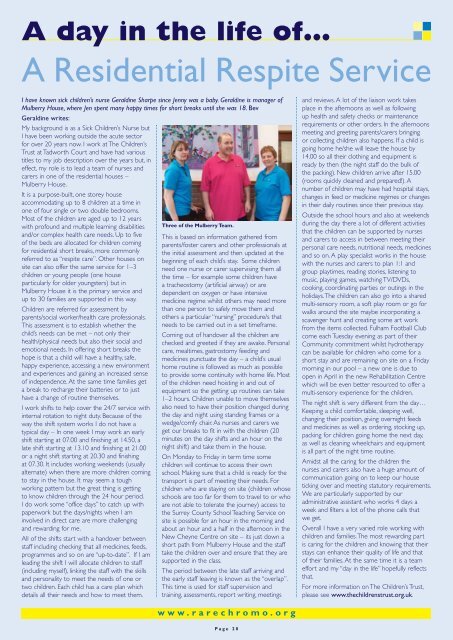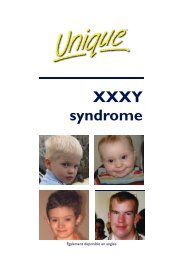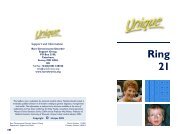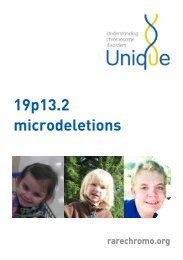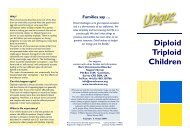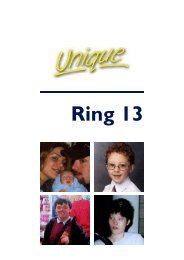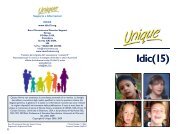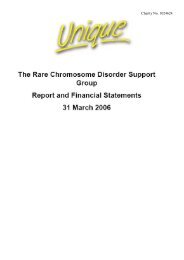Edna at the Palace! - Unique - The Rare Chromosome Disorder ...
Edna at the Palace! - Unique - The Rare Chromosome Disorder ...
Edna at the Palace! - Unique - The Rare Chromosome Disorder ...
Create successful ePaper yourself
Turn your PDF publications into a flip-book with our unique Google optimized e-Paper software.
A day in <strong>the</strong> life of…<br />
A Residential Respite Service<br />
I have known sick children’s nurse Geraldine Sharpe since Jenny was a baby. Geraldine is manager of<br />
Mulberry House, where Jen spent many happy times for short breaks until she was 18. Bev<br />
Geraldine writes:<br />
My background is as a Sick Children’s Nurse but<br />
I have been working outside <strong>the</strong> acute sector<br />
for over 20 years now. I work <strong>at</strong> <strong>The</strong> Children’s<br />
Trust <strong>at</strong> Tadworth Court and have had various<br />
titles to my job description over <strong>the</strong> years but, in<br />
effect, my role is to lead a team of nurses and<br />
carers in one of <strong>the</strong> residential houses –<br />
Mulberry House.<br />
It is a purpose-built, one storey house<br />
accommod<strong>at</strong>ing up to 8 children <strong>at</strong> a time in<br />
one of four single or two double bedrooms.<br />
Most of <strong>the</strong> children are aged up to 12 years<br />
with profound and multiple learning disabilities<br />
and/or complex health care needs. Up to five<br />
of <strong>the</strong> beds are alloc<strong>at</strong>ed for children coming<br />
for residential short breaks, more commonly<br />
referred to as “respite care”. O<strong>the</strong>r houses on<br />
site can also offer <strong>the</strong> same service for 1–3<br />
children or young people (one house<br />
particularly for older youngsters) but in<br />
Mulberry House it is <strong>the</strong> primary service and<br />
up to 30 families are supported in this way.<br />
Children are referred for assessment by<br />
parents/social worker/health care professionals.<br />
This assessment is to establish whe<strong>the</strong>r <strong>the</strong><br />
child’s needs can be met – not only <strong>the</strong>ir<br />
health/physical needs but also <strong>the</strong>ir social and<br />
emotional needs. In offering short breaks <strong>the</strong><br />
hope is th<strong>at</strong> a child will have a healthy, safe,<br />
happy experience, accessing a new environment<br />
and experiences and gaining an increased sense<br />
of independence. At <strong>the</strong> same time families get<br />
a break to recharge <strong>the</strong>ir b<strong>at</strong>teries or to just<br />
have a change of routine <strong>the</strong>mselves.<br />
I work shifts to help cover <strong>the</strong> 24/7 service with<br />
internal rot<strong>at</strong>ion to night duty. Because of <strong>the</strong><br />
way <strong>the</strong> shift system works I do not have a<br />
typical day – In one week I may work an early<br />
shift starting <strong>at</strong> 07.00 and finishing <strong>at</strong> 14.50, a<br />
l<strong>at</strong>e shift starting <strong>at</strong> 13.10 and finishing <strong>at</strong> 21.00<br />
or a night shift starting <strong>at</strong> 20.30 and finishing<br />
<strong>at</strong> 07.30. It includes working weekends (usually<br />
altern<strong>at</strong>e) when <strong>the</strong>re are more children coming<br />
to stay in <strong>the</strong> house. It may seem a tough<br />
working p<strong>at</strong>tern but <strong>the</strong> gre<strong>at</strong> thing is getting<br />
to know children through <strong>the</strong> 24 hour period.<br />
I do work some “office days” to c<strong>at</strong>ch up with<br />
paperwork but <strong>the</strong> days/nights when I am<br />
involved in direct care are more challenging<br />
and rewarding for me.<br />
All of <strong>the</strong> shifts start with a handover between<br />
staff including checking th<strong>at</strong> all medicines, feeds,<br />
programmes and so on are “up-to-d<strong>at</strong>e”. If I am<br />
leading <strong>the</strong> shift I will alloc<strong>at</strong>e children to staff<br />
(including myself), linking <strong>the</strong> staff with <strong>the</strong> skills<br />
and personality to meet <strong>the</strong> needs of one or<br />
two children. Each child has a care plan which<br />
details all <strong>the</strong>ir needs and how to meet <strong>the</strong>m.<br />
Three of <strong>the</strong> Mulberry Team.<br />
This is based on inform<strong>at</strong>ion g<strong>at</strong>hered from<br />
parents/foster carers and o<strong>the</strong>r professionals <strong>at</strong><br />
<strong>the</strong> initial assessment and <strong>the</strong>n upd<strong>at</strong>ed <strong>at</strong> <strong>the</strong><br />
beginning of each child’s stay. Some children<br />
need one nurse or carer supervising <strong>the</strong>m all<br />
<strong>the</strong> time – for example some children have<br />
a tracheostomy (artificial airway) or are<br />
dependent on oxygen or have intensive<br />
medicine regime whilst o<strong>the</strong>rs may need more<br />
than one person to safely move <strong>the</strong>m and<br />
o<strong>the</strong>rs a particular “nursing” procedure/s th<strong>at</strong><br />
needs to be carried out in a set timeframe.<br />
Coming out of handover all <strong>the</strong> children are<br />
checked and greeted if <strong>the</strong>y are awake. Personal<br />
care, mealtimes, gastrostomy feeding and<br />
medicines punctu<strong>at</strong>e <strong>the</strong> day – a child’s usual<br />
home routine is followed as much as possible<br />
to provide some continuity with home life. Most<br />
of <strong>the</strong> children need hoisting in and out of<br />
equipment so <strong>the</strong> getting up routines can take<br />
1–2 hours. Children unable to move <strong>the</strong>mselves<br />
also need to have <strong>the</strong>ir position changed during<br />
<strong>the</strong> day and night using standing frames or a<br />
wedge/comfy chair. As nurses and carers we<br />
get our breaks to fit in with <strong>the</strong> children (20<br />
minutes on <strong>the</strong> day shifts and an hour on <strong>the</strong><br />
night shift) and take <strong>the</strong>m in <strong>the</strong> house.<br />
On Monday to Friday in term time some<br />
children will continue to access <strong>the</strong>ir own<br />
school. Making sure th<strong>at</strong> a child is ready for <strong>the</strong><br />
transport is part of meeting <strong>the</strong>ir needs. For<br />
children who are staying on site (children whose<br />
schools are too far for <strong>the</strong>m to travel to or who<br />
are not able to toler<strong>at</strong>e <strong>the</strong> journey) access to<br />
<strong>the</strong> Surrey County School Teaching Service on<br />
site is possible for an hour in <strong>the</strong> morning and<br />
about an hour and a half in <strong>the</strong> afternoon in <strong>the</strong><br />
New Cheyne Centre on site – its just down a<br />
short p<strong>at</strong>h from Mulberry House and <strong>the</strong> staff<br />
take <strong>the</strong> children over and ensure th<strong>at</strong> <strong>the</strong>y are<br />
supported in <strong>the</strong> class.<br />
<strong>The</strong> period between <strong>the</strong> l<strong>at</strong>e staff arriving and<br />
<strong>the</strong> early staff leaving is known as <strong>the</strong> “overlap”.<br />
This time is used for staff supervision and<br />
training, assessments, report writing, meetings<br />
and reviews. A lot of <strong>the</strong> liaison work takes<br />
place in <strong>the</strong> afternoons as well as following<br />
up health and safety checks or maintenance<br />
requirements or o<strong>the</strong>r orders. In <strong>the</strong> afternoons<br />
meeting and greeting parents/carers bringing<br />
or collecting children also happens. If a child is<br />
going home he/she will leave <strong>the</strong> house by<br />
14.00 so all <strong>the</strong>ir clothing and equipment is<br />
ready by <strong>the</strong>n (<strong>the</strong> night staff do <strong>the</strong> bulk of<br />
<strong>the</strong> packing). New children arrive after 15.00<br />
(rooms quickly cleaned and prepared!). A<br />
number of children may have had hospital stays,<br />
changes in feed or medicine regimes or changes<br />
in <strong>the</strong>ir daily routines since <strong>the</strong>ir previous stay.<br />
Outside <strong>the</strong> school hours and also <strong>at</strong> weekends<br />
during <strong>the</strong> day <strong>the</strong>re a lot of different activities<br />
th<strong>at</strong> <strong>the</strong> children can be supported by nurses<br />
and carers to access in between meeting <strong>the</strong>ir<br />
personal care needs, nutritional needs, medicines<br />
and so on. A play specialist works in <strong>the</strong> house<br />
with <strong>the</strong> nurses and carers to plan 1:1 and<br />
group playtimes, reading stories, listening to<br />
music, playing games, w<strong>at</strong>ching TV/DVDs,<br />
cooking, coordin<strong>at</strong>ing parties or outings in <strong>the</strong><br />
holidays. <strong>The</strong> children can also go into a shared<br />
multi-sensory room, a soft play room or go for<br />
walks around <strong>the</strong> site maybe incorpor<strong>at</strong>ing a<br />
scavenger hunt and cre<strong>at</strong>ing some art work<br />
from <strong>the</strong> items collected. Fulham Football Club<br />
come each Tuesday evening as part of <strong>the</strong>ir<br />
Community commitment whilst hydro<strong>the</strong>rapy<br />
can be available for children who come for a<br />
short stay and are remaining on site on a Friday<br />
morning in our pool – a new one is due to<br />
open in April in <strong>the</strong> new Rehabilit<strong>at</strong>ion Centre<br />
which will be even better resourced to offer a<br />
multi-sensory experience for <strong>the</strong> children.<br />
<strong>The</strong> night shift is very different from <strong>the</strong> day…<br />
Keeping a child comfortable, sleeping well,<br />
changing <strong>the</strong>ir position, giving overnight feeds<br />
and medicines as well as ordering, stocking up,<br />
packing for children going home <strong>the</strong> next day,<br />
as well as cleaning wheelchairs and equipment<br />
is all part of <strong>the</strong> night time routine.<br />
Amidst all <strong>the</strong> caring for <strong>the</strong> children <strong>the</strong><br />
nurses and carers also have a huge amount of<br />
communic<strong>at</strong>ion going on to keep our house<br />
ticking over and meeting st<strong>at</strong>utory requirements.<br />
We are particularly supported by our<br />
administr<strong>at</strong>ive assistant who works 4 days a<br />
week and filters a lot of <strong>the</strong> phone calls th<strong>at</strong><br />
we get.<br />
Overall I have a very varied role working with<br />
children and families. <strong>The</strong> most rewarding part<br />
is caring for <strong>the</strong> children and knowing th<strong>at</strong> <strong>the</strong>ir<br />
stays can enhance <strong>the</strong>ir quality of life and th<strong>at</strong><br />
of <strong>the</strong>ir families. At <strong>the</strong> same time it is a team<br />
effort and my “day in <strong>the</strong> life” hopefully reflects<br />
th<strong>at</strong>.<br />
For more inform<strong>at</strong>ion on <strong>The</strong> Children’s Trust,<br />
please see www.<strong>the</strong>childrenstrust.org.uk.<br />
www.rarechromo.org<br />
Page 20


